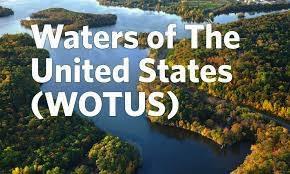The Supreme Court of the United States voted 5 to 4 based on judicial philosophy in Sackett v EPA. to nullify the EPA WOTUS Rule issued by the current Administration. The majority confined the jurisdiction of the EPA to only regulate water that has a “continuous surface connection to major bodies of water”. The decision that sets aside the EPA WOTUS Rule, currently in effect in only 24 states, now provides clarity to environmental regulators, the agricultural community, project developers and landowners.

The majority opinion, written by Justice Samuel Alito, stated, “We hold that the Clean Water Act extends to only those wetlands with a continuous surface connection to bodies that are waters of the United States in their own right.”
Justice Elena Kagan, writing for the minority, maintained that the courts have established themselves as decision-makers on environmental policy creating an undesirable precedent. Justice Brett Kavanaugh noted that the principle of a continuous surface connection deviates from established EPA policy and would have “significant repercussions for water quality and flood control throughout the United States”.

The agricultural community that filed briefs in support of the Sacketts hailed the SCOTUS decision as a “victory for farmers, ranchers and landowners”. Zippy Duvall, President of the American Farm Bureau, stated, “It’s now time for the Biden Administration to rewrite the Waters of the United States Rule.” He added, “Farmers deserve a rule that provides clarity and doesn’t require a team of attorneys to properly care for their land.” The decision by SCOTUS overturns the opinion of former Justice Anthony Kennedy that assigned EPA the jurisdiction over land that could accumulate water that would ultimately enter larger waterways.